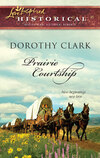Kitabı oku: «The Law and Miss Mary», sayfa 3
“I have told you, James.”
“No, you have not. You told me that he carried your basket home.” He frowned at her. “I cannot believe the grocer would have a boy that dirty and unkempt working for—”
“James!” Mary launched herself through the intervening space into his arms. “James, you are a genius! What a wonderful idea.”
She planted a kiss on his cheek and spun out of his grasp. “I have been trying to think of what to do to help Ben. He is such a proud young boy, and you—” She stopped, frowned. “Of course, Mr. Simpson will not care for your idea. At least, not at first.” She paced the short distance across the room, turned and headed back. “But Mrs. Simpson…Yes, I am almost certain she—”
He reached out and caught her by the shoulders. “Mary, what you are talking about? What idea? And who are Mr. and Mrs. Simpson? What have they to do with this boy from the streets? And what has he to do with us?”
“Nothing. And everything.” She locked her gaze with his. “Ben is an orphan, James. And half-starved. Would you have let him be arrested and taken to jail for stealing bread to eat?”
Her words were soft, but challenging. James released his grip on her shoulders and straightened.
“You ask that question of me, Mary? You know I would not.”
She placed her hand on his arm. “I do know, James. And I meant no offense. I asked only so you would place yourself in my position.” She gave him a wry smile. “Neither one of us would be able to face Aunt Laina again if we allowed such a thing to happen in our presence.”
He nodded, and his lips curved in a smile that matched her own. “True. Nor Mother and Father, either.” His smile faded. “But you still have not told me how you met Ben. Or—”
“Or what?”
He shook his head. “My questions will wait until after I hear your story.” He draped his arm around her shoulders, then led her to the settee and sat down beside her. “I am all ‘at sea.’ Begin.”
“Yes, of course.” She tucked a wayward strand of hair in the loose knot on the crown of her head and looked over at him. “You know I had marketing to do this morning—food stores and such?”
He nodded, then grinned at her. “It will take some time for me to get used to the idea of you doing household tasks, but…yes, we discussed that last night, Miss Housekeeper.” His grin widened.
She gave him her “big sister” look. “If you wish to hear the story, James, be serious!”
He tamed his grin to a smile and dipped his head in agreement. “I shall be.”
“Very well, then.” She angled her body toward him. “I was nervous about going to the levee alone—because of the Indians and mountain men—so I decided to go to your office and ask you to accompany me.”
His levity fell away. He frowned. “Goodwin did not tell me that you came to see me.”
“Because I did not.” The memory of Captain Benton’s grinning face flashed. Warmth crept across her cheekbones.
James stared.
Bother! Mary lifted her chin and gave him a look that dared him to comment about her blush.
He passed on the challenge. “Go on.”
“At the front door, I chanced upon Captain Benton, who had called and found you busy in a meeting with some other gentlemen.” She looked down at her hands. “He inquired as to my dismay at your unavailability and, when I explained, offered to accompany me to the grocer’s.” In spite of her effort, there was a tinge of defensiveness in her voice. She looked up.
James grinned. “So the captain is the cause of that heightened color in your cheeks. I shall have to remember to thank him for his kindness to you when next I see him.”
She gave a little huff. “Stop teasing, James! It was duty, not kindness that prompted the captain’s actions. Now…as I was saying. The captain and I were walking along Front Street when Ben came running toward us, with the grocer giving chase. He caught the boy and told Captain Benton to throw him in jail with the rest of the thieves.” She paused, taking a breath.
“And you intervened?”
“Well, of course I did! It was obvious the boy was half-starved and frightened out of his wits. I thought surely the captain would show mercy, but when I protested the arrest, he said the boy was guilty of theft and he had no choice but to take him to jail.” She jutted her chin into the air. “So I told him I would pay for the roll, struck a bargain with Ben to carry my basket and informed Captain Benton I had no further need of his services!”
She expelled her breath in another huff, then gave him a smile of pure satisfaction. “And that is how I met Ben and enticed him to come home with me. I suspected from his condition he was an orphan. On the way home I managed to get him to talk about his past.” She sprang to her feet.
James rose. “And did you find out about his parents? Is he an orphan?”
“Yes. Ben’s mother died two years ago. And last fall his father sold their farm and made plans to come west in the company of some friends. They started their journey this spring. Ben’s father was killed fighting river pirates on their way down the Ohio.”
“Poor Ben!”
“Yes. Poor Ben. The friends brought him downriver with them to St. Louis, took his father’s possessions as payment, then told him there was no room for him in their wagon.” Anger surging, she paced across the room, then headed back. “They left him here with no one to care for him while they joined a wagon train and traveled on.” She stopped in front of him. “How could they do that, James? How could they rob a child, then simply leave him like that?”
He shook his head. “I have no answer for such unconscionable behavior, Mary. But I know Aunt Laina would be very proud of you. As would Mother and Father. As am I.”
“But?” She gave him a quizzical look.
“But…I see some difficulties we must find solutions for. What do we do with Ben now?” He lifted a hand and rubbed the back of his neck, peering down at her. “Have you given thought to that? Is there an orphanage—”
Mary threw her arms around his neck and squeezed with all her might.
He returned the squeeze, giving her a puzzled look when she stepped away. “Thank you. But what was that for?”
“The ‘we.’” She smiled up at him. “There is no orphanage, James. But the most wonderful thing has happened! Ivy is going to take Ben home to live with her. She is recently widowed and her children are grown and gone from home. It is perfect. Ben will be well cared for, and Ivy will not be lonely.”
“That is a happy solution.”
“Yes. And now you have solved the other problem.” She whirled away, turned back and clasped his hands. “I have been concerned over the cost to Ivy for Ben’s care. And over Ben’s feelings. He is a very honorable and proud little boy who wants to earn his way. Why, hungry as he was, he would not eat the roll and cheese I promised him as payment for his help until he had carried my basket home, for that was our agreement. Anyway…” She squeezed his hands. “Oh, James, I am certain your idea will work!”
“What idea?”
“Why for Ben to work at Mr. Simpson’s store.” She let go of his hands and whisked away again, her long skirts whispering as she moved across the floor. “Marketing baskets can become very heavy when you carry them for any distance. And I am certain ladies would be willing to pay for Ben to carry their baskets home. Oh, it is a lovely idea!”
“So is dinner.” James laughed and slapped his growling stomach. “And I believe I hear Ivy carrying our meal in from the kitchen.” He made a formal bow and offered Mary his arm. “Shall we discuss this situation further while we partake of whatever it is that is creating such a delicious smell?”
“La, it shall be as you wish, good sir.” Mary lifted her skirts slightly, made him a deep curtsy, then laughed and slipped her arm through his.
James chuckled and opened the door. “I do not know if I have Ben or the captain to thank, Mary. But it is good to see you so animated again.”
Chapter Five
“We are in agreement, gentlemen?”
Sam glanced around the table, noting the response to the mayor’s question. All nine of the aldermen nodded.
“Excellent!” The mayor smiled his satisfaction. “Let the record show that final plans for the addition to the courthouse have been unanimously approved and we hereby direct the work move forward with all dispatch. Now then, on to the next piece of business. It is for this that I invited Captain Benton’s attendance on our assembly this afternoon.”
Sam gave a brief nod as the aldermen glanced his way.
The mayor cleared his throat. “Captain Benton, all of us here are aware that our city has enjoyed significant growth in the past two years. We now have a theater, a hotel, banks. A water company is in the works. And the long-delayed plans for a public school are being drawn. The vast numbers of new buildings and the cobblestone paving of many of our streets have changed the complexion of our city from that of a wilderness town. And the increased safety of our citizens is also a factor in achieving that goal. I wish to commend you, Captain Benton, on the excellent job you are doing in taming the wilder elements among us.”
There was a general murmur of agreement.
“Thank you, Mr. Mayor.” Sam acknowledged the commendation and waited. He had not been called to this meeting only to receive a compliment.
“Because of all this, there is much to recommend St. Louis to men and women of substance and refinement who are considering moving west, not to the frontier, but to an established place. We want to attract those prosperous elite to our city.”
There was another murmur of agreement.
“However…”
Sam braced himself.
“There is a problem that must be addressed if we are to be successful in our pursuit of that objective.” A frown drew the mayor’s thick brows together. “The lowborn and penurious people pouring into our city in the hopes of joining a train heading west are becoming greater in number every year. And while the monies they spend to buy wagons and supplies, or for repairing or restocking their wagons, are prospering our businessmen, the orphans and runaways they leave behind are becoming a plague, a blight on our fair city’s image. You can scarcely walk down the streets without seeing the dirty ragamuffins skulking around. Why yesterday, one of them made so bold as to walk right past my wife into Simpson’s grocer!”
Sam stiffened. The boy the Randolph woman had saved from arrest! It had to be him. Most youngsters were too frightened to go into a store alone.
“The experience was too much for my wife’s sensitive nature. She was quite undone when she reached home. Levinia had a time calming her.” The mayor scowled down the table at him. “This cannot be permitted to go on, Captain Benton! No person of wealth and culture will wish to set up business and make his home in a city that cannot keep its streets clean of such an ugly blemish. You do an excellent job of controlling the gamblers, drunks, mountain men, boatmen and others who frequent the more disreputable establishments on the levee. Yet these…these street urchins run amok among their betters. Have you an explanation for this deplorable situation, Captain?”
“I do, Mr. Mayor.” Sam glanced around the table at each of the aldermen, trying to get a sense of where they stood on the issue. “The explanation is a simple one. I arrest lawbreakers. And there is no law against children walking the streets of St. Louis. Thus, unless one of these ‘urchins’ is caught stealing, or otherwise breaking the law, there is nothing I can do about their presence on our streets.”
The mayor scowled, drumming his fingers on the table. “That is a most distressing answer, Captain.”
Sam held his face impassive, tightening the grip on his hat that rested on his knee. If this ruined his chance to court Levinia—
The mayor stopped his drumming, glanced around. “Gentlemen, we must find a way to get these ragamuffins off our streets. We can hardly pass a law denying all children that right—we have children of our own. And the people we are trying to attract for permanent settlement must be made to feel St. Louis is an ideal place for them to rear their children. They must feel we welcome their children as future productive citizens of St. Louis society. Have any of you a solution to offer?”
The aldermen shifted in their chairs, knit their brows and studied the table. Silence fell.
Sam held back a scowl. It seemed Miss Randolph’s interference with that boy’s arrest had stirred up a pile of trouble. He turned his hat in his hands and waited.
Alderman Field cleared his throat, leaned forward and looked toward the mayor at the head of the table. “What if we pass a law to the effect that any child under the age of twelve who is not a citizen of St. Louis must be accompanied by an adult when in town?”
The mayor leaned back in his chair, rested the heels of his hands on the table and drummed his fingers. After a moment he nodded. “That might work, Arthur. If any outsider questions the law, we will explain it is for the children’s safety. Yes. That might work.” The mayor’s gaze shifted.
Sam straightened.
“Would that law give you the authority you need to get these dirty, unkempt jackanapes off our streets, Captain?”
“It would. As long as they are not accompanied by an adult, Mr. Mayor.”
“Excellent! Excellent! All in favor of such a law?” The mayor smiled at the affirmative chorus. “Let the record show the law passed by unanimous vote. Captain Benton, you are hereby instructed to procure posters giving notice of the new law and post them in plain sight at the fields outside of town where these wagon trains form. And that, gentlemen, should settle our problem.”
“And create another, Mr. Mayor.”
The mayor’s smile dissolved into another frown. “And what problem is that, Captain?”
“What do I do with the children I arrest? Our jail is meant for adults. There are no provisions for young—” Sam stopped, stared at the mayor’s uplifted hand and held his silence.
“Your concern is misplaced, Captain. Those urchins are accustomed to rough conditions. They need no special provisions. Jail will likely be an improvement on their present living conditions. Now…you have heard the law, and you have your instructions. I am certain you will carry them out in your usual exemplary fashion. And that concludes our business. This meeting is adjourned.”
Sam unlocked the cell door and pulled it open. “All right, Larkin, time’s up. You’re free to go. And stay sober. You cut up another man and I’ll lock you up and throw away the key.”
The large, bearded man rose from the cot and swaggered toward him. “Your threat don’t scare me, Captain.”
“That’s a shame. Because it should.” Sam smiled, a quiet smile that carried a promise, and stepped back to let Larkin pass. The big man’s boots thudded against the plank floor, fading as he crossed the outer room. The outside door opened, then slammed shut.
The jail was empty again. But for how long? Sam glanced into the vacant cells. Thanks to the mayor’s ridiculous law they would soon be filled with children. And what would he do with them? Grown men he could handle. But youngsters?
He frowned, strode to the outer room and dropped into his chair. One of those cells would already be occupied by a boy if Miss Randolph had not interfered.
He scrubbed his hand over the back of his neck, then shoved his heels against the floor and rocked back on the chair’s hind legs. The look in those brown eyes of hers when he had been about to arrest that little thief had made him feel lower than a worm’s belly. But when she had looked at the boy…
Sam shook his head, laced his hands behind his neck and stared up at the crack in the ceiling. Why had she been so concerned about a boy she didn’t even know? And what was she hiding? Why didn’t she want him to know where she was from? Not that that was rare on the frontier. Plenty of people who came west didn’t want their past known. Still, if it had anything to do with her brother and the M and M line…
Sam shifted his weight, rode the chair forward till the front legs hit the floor. It was time to pay that call on James Randolph. Maybe he would be more forthcoming than his sister.
Mary stepped back toward the edge of the street and scanned the storefronts. Shoes…candles…cigars…
“You look a little lost, Miss Randolph.”
She gasped, and spun around to stare at a blue shirt. One with a badge pinned to it. She lifted her gaze to Samuel Benton’s face. Blue eyes gazed down at her.
“I did not mean to startle you, Miss Randolph. Only to assist you—if I am able to do so.” He smiled and indicated the package in her basket. “I see you are doing some shopping. I hope you are finding our stores compare favorably with the ones you left behind in…”
“I have only been in one shop thus far, Captain Benton. That is hardly enough to make any comparisons.” Mary looked again at the storefronts. The man’s presence scattered her wits, and she needed to keep her senses about her. That was the second time he had tried to find out where she had lived back east. “I was searching for an emporium. Or a haberdasher.” She glanced up at him. “I need to buy some items for Ben. Suspenders and such. If you would be so kind as to direct me?”
“Miss Mayfield’s Emporium is five stores down, just before the corner.” He stepped out of the way of shoppers passing by. “I’m glad I happened upon you, Miss Randolph. You have saved me an embarrassment. I’m on my way to speak with your brother and I thought his name was James, not Ben.”
“My brother’s name is James, Captain Benton. Ben is the young boy I took home yesterday.” She gave him a cool look. “The boy you wanted to arrest.”
“You took that boy home with you?”
Mary stiffened. “You need not look so shocked, Captain. Indeed, I find it offensive that you deem me the sort of person who would leave a child to roam the streets starving and uncared for.” She looked him straight in the eyes. “What else was I to do but take him home with me? Let him be jailed?” Her challenge hit the mark, judging from the darkening of his blue eyes.
“What else—” He stopped, stared at her and sucked in air.
A surge of satisfaction flooded her. The man looked quite nettled. Good. Perhaps he would not be so eager to arrest another helpless child. She peered at him and waited.
“I assure you, Miss Randolph, I meant no offense.”
Her hope flattened. So he was not going to change his mind about arresting children. She gave him a curt nod. “If that is so, Captain, then I accept your apology. Good day.” She whisked about with a swirl of her long skirts and started down the street, focusing her attention on the storefronts. She refused to acknowledge her disappointment or to look back in spite of the tense feeling between her shoulder blades that told her he was staring after her.
Sam fisted his hand and rapped on the partially open door. This interview should be interesting if James Randolph was half as exasperating as his sister. That woman was undeniably the most sharp-tongued, irritating—
The door opened. Sam wiped the scowl from his face.
“Ah, Captain Benton. Come in.”
“Mr. Randolph.” Sam closed the door of James Randolph’s office, shut all thought of the man’s sister from his mind and extended his hand. Randolph’s gaze was straightforward and friendly, his grip firm.
“How may I be of service, Captain?”
Sam shook his head. “There is nothing in particular, Mr. Randolph. I am sure Goodwin has informed you of all the regulations concerning businesses and steamboats in St. Louis. I am here because I make it a practice to call on new businessmen in town to let them know who I am, and that I am ready to assist them if they have any problems of a legal nature.”
“An excellent idea, Captain. I appreciate the gesture. I shall certainly call on you should the need arise.” James Randolph smiled and indicated the chair in front of his desk. “Please, have a seat.”
Sam noted the openness in Randolph’s face and gesture. It was not indicative of a man with something to hide from the law. But appearances could be deceiving. He removed his hat and folded his long frame into a Windsor chair. “I stopped by yesterday, but you were engaged in a meeting. You want to be careful who you deal with, Mr. Randolph. St. Louis sits on the edge of the frontier, and that creates problems unknown in the cities back east. It is easy for a man to cheat someone, then simply up and disappear—though we have ways of tracking them down eventually.”
Sam watched James Randolph carefully, hoping to detect the slightest change in expression or demeanor as he talked. The veiled warning seemed to have no effect on the man. Randolph was either dense, honest—or a good actor. He pushed on. “We are doing our best to tame the less restrained who come to town to celebrate after months in the mountains or a long and successful journey upriver. And, also, to maintain some control over the establishments they frequent and the undesirable…er…shall we say, residual effects of those visits. And then, of course, there are the Indians. They are usually quite a shock to those who come to St. Louis from the eastern cities.” He stared into James Randolph’s eyes. “I assume you had no Indians freely roaming the streets of your city?”
“Nary a one, Captain. And you are right—they were quite a shock. Especially to my sister. Mary was reluctant to face them on her own. As was I, to have her do so.” James Randolph rose, stepped around the desk toward him and extended his hand again. “Thank you, Captain Benton, for your kindness in escorting Mary to market yesterday. You have my deepest appreciation.”
Sam rose and grasped the offered hand. “No thanks are needed, Mr. Randolph. It is my duty to see to the safety and comfort of St. Louis’s citizens.” He quirked his lips in a wry smile. “And I am not at all sure your sister shares your gratitude. My services as her escort were summarily dismissed after an encounter with a young thief.”
“Yes, I heard of that.” James Randolph’s smile matched his own. “Mary can be a little autocratic when riled. And she has a soft heart for those who are downtrodden. Nonetheless, she is grateful for your assistance.” The smile faded from Randolph’s face. “Now, as you say there is nothing we need discuss, I must beg your pardon, Captain. The Mississippi and Missouri steamer line seems to have been run in a very slipshod manner by the previous owner and his manager, and I have much to do to set it aright.”
Sam nodded. The disquiet was back. He filed away the two pieces of information he had learned from the visit. Thomas had run the steamer line in a careless manner, and James Randolph was hiding something. He had adroitly avoided the invitation to divulge the name of the eastern city of his origin—as had his sister. Perhaps it was time to tip his hand and shake Randolph up a bit, see what fell out into the open.
“I understand.” Sam tugged on his hat and moved to the door. “Thank you for your time, Mr. Randolph. I make it my business to find out about the people who take up residence in St. Louis. And, if in the course of your familiarizing yourself with this business, you find that need for my services, do not hesitate to call upon me.” He dipped his head and walked from the room, leaving James Randolph staring after him.
A steamship’s horn pierced the silence. Another answered. Mary turned onto her back and sighed. She tossed the sheet aside, slipped her feet into her silk slippers and used the brilliant starlight to guide her to the window. Sleep was impossible. She was supposed to be in Philadelphia planning her wedding. Instead, she was at the edge of a wilderness in St. Louis, Missouri, facing an unknown future. How could she sleep when her whole life had gone topsy-turvy?
Her stomach cramped. She pressed her hands against her abdomen and took a long, slow breath to ease the pain of the nervous spasm. What would life hold for her? It was true she would rather be a spinster than some man’s bargain. But that did not mean her desire to love and be loved, to marry and have children, to grow old with a beloved husband beside her was gone. It was all in her heart, and stronger than ever.
Tears welled. Poor little Miss Mary. She’ll have a hard time findin’ herself a husband, bein’ plain like she is. Now, if she was blessed with the beauty of Miss Sarah… Oh, how true her nanny’s words had proved to be.
Mary blinked the tears away and lifted her face toward the dark sky, the same questions that had plagued her all her growing-up years swirling in her mind. Why had God made her tall and thin and dark-haired? And, what was worse, given her the bold, forthright nature that was off-putting to men? Why had He not made her small and blond like her sister, with a golden beauty and gentle sweet nature that drew men the way nectar drew bees? The way Victoria drew Winston. Why did God not love her as much as He did others?
The familiar hurt squeezed her chest, made it hard to draw her breath. She opened the sash, then went to her knees, crossed her arms on the sill and rested her chin on them to catch any movement of air. Muffled sounds of revelry, from the direction of the levee, floated in on a warm breeze. A steamboat blasted its whistle. Another answered. The noise of the levee continued day and night. And it was all so strange and new.
Fear nibbled at the last shreds of her composure. The tears she had held back slipped down her cheeks. What had she done? Was her decision to leave Philadelphia a right or wrong one? Should she have swallowed her hurt and her pride and accepted Winston as her husband even though she knew it was only her father’s money he wanted? Was he her last chance for a family of her own? Was the pretense of love better than a life alone?
“Twelve o’clock and all is well.”
The words came, muted but distinct. She grasped on to them like a lifeline. Twelve o’clock—the beginning of a new day. And all is well. Pray God it might be so.
Sam leaped back from the slashing blade, grabbed the mountain man’s thick wrist and twisted. The double-edged skinning knife clattered to the floor. He grabbed a fistful of the cursing drunk’s buckskin shirt and shoved him toward his deputy. “Take him to jail and let him sleep off his meanness. I’ll run him out of town in the morning.” He picked up the weapon and walked outside.
A roar of voices calling for whiskey or beer erupted behind him. Music started playing. The din mixed with the noise coming from the other saloons, the lapping of river water, the churning of paddle wheels and the blasting of steam whistles to make St. Louis’s own peculiar sound of revelry.
“Twelve o’clock and all is well.”
Twelve o’clock. Time to go home and let his lieutenant and the night guards take over.
Home. Sam snorted, adjusted his hat and started up the road. Home was a room in Mrs. Warren’s boardinghouse on Walnut Street, handy to the jail and courthouse. True, it was a vast improvement over the broken-down hovels he had lived in as a kid. Or the open fields, hay mows and sheds that had been his only shelter after he had run away from his drunk of a father. But it was far from what he had planned. Still, he was getting close. He had made some smart investments that were swelling his bank account. And now, he was gaining entrance to St. Louis society by courting the mayor’s daughter. Yes, he was getting close.
He turned onto Walnut, glanced up at the dark, star-littered sky and smiled with grim satisfaction. Remember when I was seven years old and I begged You for some warm clothes for Daniel and Ma and me, God? Remember how I begged You for a house without holes in the walls and roof so we could be warm and dry? For somebody to come and help us? A hard knot of resentment twisted in his stomach. Remember how Danny and Ma sickened and died from the cold? I told You then I would make it without You. That I would be “somebody” someday, and no one would sneer at me ever again. Remember, God? Well, keep watching, because I am almost there.
He threw a last disdainful look at the sky, took the porch steps two at a time, pulled open the door and went inside.
Ücretsiz ön izlemeyi tamamladınız.


















